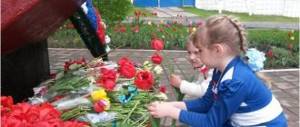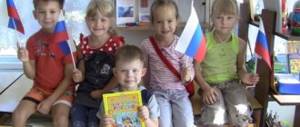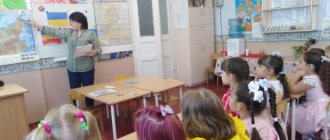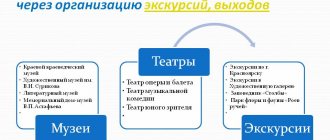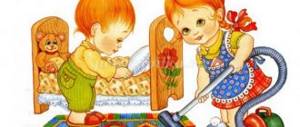Consultation for parents. “How to introduce children to moral and patriotic education?”
1. Teach your child to take care of things, toys, and books. Explain to him that the work of many people is put into every thing. Treat books with care and promote interest in the content. Go to the library with your child and see how books are stored there. This game technique “like in a library” will help teach your child to treat books with care.
2. Preschoolers very early begin to show interest in the history of the country or region. If there are monuments in the city, organize excursions to them and tell everything you know about how the memory of the dead is honored. You can make exciting trips around our country and around the world using the globe, maps and photographs.
3.If the child has building materials, you can invite him to build a house. When the house is built, play housewarming with your child, help place dolls, bunnies, and bears. See if the house is solidly built, beautiful, and comfortable to live in.
4. Cultivate in your child a respectful and caring attitude towards bread. Observe how the bread is delivered and unloaded. Tell us how bread is grown, how much work is put into it, together with your child, dry the leftover bread, make crackers.
5. Tell your child about your work: what you do, what benefits your work brings to people, to the Motherland. Tell us what you like about your work.
6. When returning with your child from kindergarten, invite him to play the game “Who has noticed more interesting things?” “Let’s tell each other who has noticed more interesting things on our street. I see cars cleaning the street. What do you see? The game teaches observation skills and helps to form ideas about the environment. At home, invite your child to draw what they liked best.
7.Love for the Motherland is also love for the nature of the native land. Communication with nature makes a person more sensitive and responsive. In winter on skis, in summer on a bicycle or on foot, it is useful to go with your child to the forest to admire its beauty, the murmur of a stream, and the singing of birds. When cultivating love for their native land, it is important to teach a child to take care of nature and protect it.
How to raise a little patriot?
Contents of patriotic education of preschool children:
* introducing children to cultural heritage, holidays, traditions, folk applied arts, oral folk art, musical folklore, folk games.
* getting to know the family, its history, relatives, family traditions, drawing up a pedigree; with the kindergarten, its children, adults, games, toys, traditions; with the city, village, its history, coat of arms, traditions, outstanding citizens, villagers of the past and present, sights;
* conducting targeted observations of the condition of objects in different seasons of the year, organizing seasonal agricultural work in nature, sowing flowers, vegetables, planting bushes, trees, etc.;
* organization of creative, productive, playful activities for children, in which the child shows sympathy and care for people, plants, animals in different seasons of the year in connection with adaptation to new living conditions and daily, as necessary.
For more effective work on instilling patriotism in preschoolers, the following pedagogical conditions are necessary:
- heuristic environment in kindergarten and in the family,
- close cooperation between kindergarten teachers and family members,
— preparedness of teachers and parents to solve problems of instilling patriotism in children.
The heuristic environment is characterized by saturation with positive emotions and is a field for the child to demonstrate creativity, initiative, and independence.
Close cooperation between kindergarten teachers and family members is expressed in the establishment of trusting business contacts with the families of pupils; providing parents with a minimum of psychological and pedagogical information, teaching them how to communicate with their child; ensuring regular interaction between children, teachers and parents; involvement of family members in the pedagogical process; creating a subject-based developmental environment in kindergarten and family.
The preparedness of teachers to carry out the process of forming patriotism presupposes that they have an appropriate level of professional competence, professional skill, as well as the ability for self-regulation and self-discipline to solve assigned problems.
All of the above pedagogical conditions are interconnected and interdependent.
If in childhood a child experienced a feeling of pity for another person, joy from a good deed, pride in his parents, admiration from contact with a wonderful feat, he acquired an emotional experience.
In this way, paths will be built for associations of an emotional nature, and this is the basis, the foundation of deeper feelings, a condition for the full development of a person.
The upbringing of a little patriot begins with what is closest to him - his home, the street where he lives, kindergarten.
* Draw your child’s attention to the beauty of his hometown
* While walking, tell us what is on your street, talk about the meaning of each object.
* Give an idea of the work of public institutions: post office, store, library, etc. Observe the work of the employees of these institutions, note the value of their work.
* Together with your child, take part in the work of improving and landscaping your yard.
* Expand your own horizons
* Teach your child to correctly evaluate their actions and the actions of other people.
* Read him books about his homeland, its heroes, traditions, culture of his people
* Encourage your child for his desire to maintain order and exemplary behavior in public places.
Consultation for parents “The role of the family in instilling patriotic feelings in preschoolers”
ANNEX 1
CONSULTATION for parents
“The role of the family in instilling patriotic feelings in preschoolers”
Compiled by: Ermilova Marina Konstantinovna, teacher
How often the words “Russian soul”, “phenomenon of the Russian soul” are heard in our time. But no less often: “decline of morality”, “degradation of society”. Therefore, today, perhaps, the issues of moral education of children are more relevant than ever. Times, eras, people change. But man’s desire for goodness, love, light, beauty, and truth remains eternal.
Preschool age is the foundation of a child’s overall development, the starting period of all high human principles. Preserving the humanity in our children, laying moral foundations that will make them more resistant to unwanted influences, teaching them the rules of communication and the ability to live among people - these are the main ideas for educating moral and patriotic feelings in preschoolers. The greatest happiness for parents is to raise healthy, highly moral children.
It is common knowledge that preschoolers are very emotional. This emotional and figurative perception of the world around us can become the basis for the formation of patriotism.
The feeling of patriotism is so multifaceted in its content that it cannot be defined in a few words. This is love for one’s native places, and pride in one’s people, in their culture, and a sense of one’s inseparability with the environment, and the desire to preserve and increase the wealth of one’s country.
The feeling of the Motherland begins with admiration for what the child sees in front of him, what he is amazed at and what evokes a response in his soul... And although many impressions are not yet deeply realized by him, but, passed through the child’s perception, they play a huge role in the formation of the personality of a patriot.
That is why the native culture, like father and mother, must become an integral part of the child’s soul, the beginning that gives rise to personality.
In moral and patriotic education, the example of adults, especially close people, is of great importance. Based on specific facts from the lives of older family members (grandparents, participants in the Great Patriotic War, their front-line and labor exploits), it is necessary to instill in children such important concepts as “duty to the Motherland,” “love of the Fatherland,” “feat of labor,” etc. .d. It is important to bring the child to understand that we won because we love our Fatherland, the Motherland honors its heroes who gave their lives for the happiness of people. Their names are immortalized in the names of cities, streets, squares, and monuments have been erected in their honor.
Spiritual, creative patriotism must be instilled from early childhood. But like any other feeling, patriotism is acquired independently and experienced individually. It is directly related to a person’s personal spirituality, its depth.
Of course, the foundation of a person’s upbringing is laid in the family. Patriotic education and interest in the spiritual beginning of our lives should also begin in the family. But today, unfortunately, there are few conditions for this. And the point here is not that parents lack time for pedagogical conversations with their children, but our desire to protect them from difficult tasks, work, and spiritual efforts. Each family is its own closed world and its own life, its own joys and sorrows, worries and traditions, its own way of life.
In a modern family, most of the time the child communicates with his mother. It is with her that a trusting relationship is formed, concerns, questions, and needs are discussed. However, communication with dad is no less important for children. The more often the father communicates with the child, the closer the emotional ties become, and the earlier the father becomes involved in caring for the baby, the stronger and deeper his parental feelings.
It has been established that in families in which parents spend a lot of time talking and playing with children, children develop better. However, it has been proven that children deprived of the opportunity to communicate with their parents or with one of them have increased sensitivity and experience difficulties in establishing contacts with peers. A serious danger for the development of a child is the lack of emotions, affection, warmth, even if his physiological needs are fully satisfied. Only constant communication between parents and child contributes to the establishment of deep emotional connections and gives rise to mutual joy.
Raising children with love and respect for their parents and honoring their ancestors is one of the leading ideas of pedagogy. Another idea is to raise a future family man from an early age by developing positive moral qualities (hard work, tolerance, compliance, diligence, modesty, honesty).
Special sociological and psychological-pedagogical research has shown that the family and kindergarten, having their own special functions, cannot replace each other and must interact for the sake of the full development of the child.
Recommendations for parents.
- Talk to your child about your family; characterize each family member individually, show a caring, respectful attitude between all family members. Look at family photos; Together with your child, draw up a “Family Coat of Arms” and “Family Tree.” From a very early age, it is necessary to teach the child to respect and cherish family traditions, to know his ancestry, and to honor the older generation. After all, the family hearth, the union of kindred souls under one roof, is the initial link of conciliar education.
- Introduce your child to the “small homeland” - a nearby street, neighborhood, hometown, its famous residents, attractions, symbols. When returning with your child from kindergarten, offer him the game “Who will notice the most interesting things?”, “What’s new on our street?”, “How do citizens decorate their area for the holiday?” Help your child see what is most important educationally: the work of people, the transformation of the appearance of a city or region. At home, invite your child to draw what he liked most about the walk.
— On weekends, organize targeted walks with your children, excursions to memorable places, memorials, the Honor Board in honor of the heroes of the Great Patriotic War, the Patriotic War of 1812; Be sure to watch the military parade and fireworks display. The child should be prepared accordingly for the upcoming excursion, think over what and how to tell about this or that object, remind and show by example that boys need to take off their hats at the obelisks; give the opportunity to lay flowers at the monuments.
— It is necessary to show children orders, medals, and photographs of the war years kept at home. A child should be proud that in their family a person close to him was a participant in the Great Historical Battle, thanks to which the country defended its independence and gave him, a small citizen, the right to a happy childhood. On Victory Day, it is advisable to go with your child to the square where veterans meet and watch the meeting. Pay attention to the joyful faces of veterans, their bright tears, listen to how they remember the days of the war. Give flowers to one of the veterans, talk to him, give the child the opportunity to ask a question. It’s good if a child in the family hears songs from the war years.
— Introduce your child to the origins of Russian folk culture. Introduce fiction based on folklore - fairy tales, epics, legends; visit exhibitions of folk arts and crafts. Together with your child, try to make a doll or amulet, or paint a matryoshka doll. Making such crafts cultivates patience, intelligence, develops creative thinking, and the ability to see the possibilities of creative transformation of objects. This is an excellent school for both patriotic and aesthetic education.
— Take care of the child’s spiritual and moral education; visit an Orthodox church, talk about Orthodoxy, about the origins of Russian holiness. Consider a selection of illustrations depicting temples and their architectural features, Russian icons; Read a children's Bible to your child. Give basic knowledge about important Orthodox holidays: Christmas, Maslenitsa, Easter, Trinity.
— Tell your child about your work: what you do, how your work benefits the country and people. If possible, show specific results of your work. Tell us what you like about your work, what moral qualities it requires: responsibility, attention, ability to communicate with other people, etc.; what would happen if you worked poorly.
— Be attentive to children’s questions, show and explain events and facts, encourage curiosity, develop the ability to observe and analyze phenomena. Read good smart books to your kids, visit libraries, exhibitions, museums, take part in sports competitions, creative competitions. Be active and caring yourself! And the results will not take long to arrive.
“Only those who love, appreciate and respect what has been accumulated and preserved by the previous generation can love the Motherland, recognize it,
become a true patriot."
S. Mikhalkov
Literature:
1. With love for Russia: methodological recommendations. - Moscow: Education of a preschooler, 2007. - 128 p.
2. Novitskaya, M. Yu. Heritage: patriotic education in kindergarten / M. Yu. Novitskaya. - Moscow: Linka-Press, 2003. - 200 p.
3. My country. Revival of national culture and education of moral and patriotic feelings in preschool children: a practical guide for educators and methodologists. - Voronezh: Teacher, 2005. - 205 p.
4. For preschoolers about defenders of the fatherland: a methodological guide to patriotic education in preschool educational institutions / ed. ed. L. A. Kondrykinskaya. - Moscow: Sfera, 2006. - 192 p.
3
Raising patriotism in the family
Start raising your child as a patriot with a normal microclimate in your family nest. You cannot quarrel with your significant other, lead an immoral lifestyle, drink alcohol and smoke cigarettes. Parents themselves must love their Motherland, then no effort on their part will be required to raise their children. Educational lessons will take place naturally and naturally, and children will be imbued with love for the Fatherland without much work for themselves.
Organization of patriotic education in libraries
The feeling of love for the Motherland begins with love for the family and the formation of a sense of responsibility for each of its members. In case of trouble, everyone should rush to the aid of one and save him as long as it is necessary and there is an opportunity. Likewise, one person should fight without hesitation for the well-being of his entire family.
Note:
You need to tell your children more often about the life of your family; there are probably outstanding personalities in your family. Take a family album and tell your children about their grandparents, aunts and uncles, brothers and sisters. Try to tell the truth, but focus on their positive achievements.
Walking around the neighborhood with parents helps strengthen patriotism. A boy can be taught to make a fire, and a girl can weave wreaths from meadow flowers. Such a pastime will be remembered for a lifetime. Even if fate in the future takes your children to distant lands, they will still reverently remember these walks in their native land.
Important:
You need to love your homeland not just for show, but with your soul and heart . The price of such love is worthless when, after loud patriotic speeches, the head of the family, as if “accidentally,” throws out the wrapper in the middle of the street.
The role of school in family patriotic education
Knowledge of the history of one's native land and country is usually given at the school desk. The Great Patriotic War is a difficult page in the history of our country, but it showed us that the united efforts of everyone and contribution to the common cause are the key to success. Hermann Goering admitted that Nazi Germany lost the war because it did not know the mentality of the Russian people. In terms of tactics and economics, all calculations were correct and aimed at victory, but in the ideological and patriotic component, it was almost impossible to defeat the Russian people.
Modern problems of patriotic education
In addition to studying and knowing your history, the following school activities to develop patriotism will make a positive contribution to the development of patriotic feelings:
- Labor lessons - here boys and girls are taught to create material values with their own hands.
- Physical education – children need to be taught to take care of their health. After all, only a healthy person will be able to take care of the development of his country and stand up for its defense if necessary.
- Literature - reading classics and contemporaries will tell children about the life of the Motherland in different eras.
Patriotic school education must necessarily overlap with family education. Regularly ask your children what they learned in class, participate in homework, and communicate with teachers. School is a second family, so don’t leave your child’s education to chance. Teachers have qualifications and experience working with children in the field of patriotic education, but they cannot completely replace the family.
Advice for parents on patriotic education of preschoolers
Tips for parents
patriotic education of preschool children.
Prepared by a teacher of the highest qualification category
Feeling of Motherland...
It starts in a child
with the relationship to the family, to the closest people - to the mother, father, grandmother, grandfather.
These are the roots that connect him with his home and immediate environment.
Preschoolers need to know
and study the culture of their ancestors.
It is the emphasis on knowledge of the history of the people,
his culture will help in the future
treat with respect and interest
to the cultural traditions of other peoples.
The basis of the moral and patriotic education of a child
lies the development of his moral feelings.
The immediate environment is of considerable importance for instilling in children interest and love for their native land. Gradually, the child gets to know the kindergarten, his street, the city, and then the country, its capital and symbols.
Any region, region, even a small village is unique!
Each place has its own nature, its own traditions and its own way of life. Selection of appropriate
The material allows preschoolers to form an idea of what their native land is famous for.
Hometown…
While walking with your child, tell him that your hometown is famous for its history, traditions, sights, monuments, and best people.
What information and concepts
Can children learn about their hometown?
· A four-year-old child knows the name of his street and the one on which the kindergarten is located.
· The attention of 5 year old children needs to be attracted
to objects that are located on the nearest streets: school, cinema, post office, pharmacy, etc., talk about their purpose, emphasize that all this was created for the convenience of people.
· The range of objects that older preschoolers are introduced to is expanding - this is the region and the city as a whole, its attractions, historical places and monuments. The children are explained in whose honor they were erected.
The older preschooler knows the name of his city, his street, the streets adjacent to it, and also in honor of whom they are named.
He needs to explain that every person has a home and a city where he
born and lives.
In moral and patriotic education, the example of adults
, especially close people. Based on specific facts from the lives of older family members (grandparents, participants in the Great Patriotic War, their front-line and labor exploits), it is necessary to instill in children such important concepts as “duty to the Motherland,” “love for the Fatherland,” “hatred of the enemy,” “feat of labor”, etc.
It is important to bring the child to the understanding that we won because we love our Fatherland, the Motherland honors its heroes who gave their lives for the happiness of people. Their names are immortalized in the names of cities, streets, squares, and monuments have been erected in their honor.
It is wrong to believe that by cultivating love only for family, we thereby instill love for the Motherland. Unfortunately, there are cases where devotion to one’s home coexists with indifference to the fate of the country, and sometimes even with betrayal. Therefore, it is important that children see the “civilian face” of their family as early as possible. ( Do they know why their grandparents received medals? Do they know their famous ancestors?..)
A continuation of moral and patriotic education is the introduction of children to other cities of Russia, to the capital of our Motherland, to the anthem, flag and emblem of the state.
Show through small to big,
dependency between activities
one person and the life of all people -
this is what is important for education
moral and patriotic
feelings of a preschooler!
This will contribute to the proper development of the microclimate in the family,
and fostering love for one’s country.
For example, when raising children to love their city, it is necessary to let them down
to the understanding that their city is a part of the Motherland, since all places, large and small, have much in common:
· Everywhere people work for everyone (teachers teach children; doctors treat the sick;
workers make machines, etc.);
· Traditions are observed everywhere: the Motherland remembers the heroes who protected it from enemies;
· people of different nationalities live everywhere and work together
and help each other;
· people take care of and protect nature;
· there are general professional and public holidays, etc.
When raising a preschooler, parents need to pay attention to
· nurturing in a child love and affection for his family, home, kindergarten, street, city;
· formation of a caring attitude towards nature and all living things;
· fostering respect for work;
· development of interest in Russian traditions and crafts;
· formation of basic knowledge about human rights;
· expanding ideas about Russian cities;
· introducing children to the symbols of the state (coat of arms, flag, anthem);
· developing a sense of responsibility and pride for the country’s achievements;
· formation of tolerance, a sense of respect for other peoples and their traditions.
It is necessary to pay attention to this in all types of children's activities:
in games, in work, in everyday life
- since they instill in a child not only patriotic feelings, but also form his relationships with adults
and peers.
Parents' task
- select from the mass of impressions received by the child,
the most accessible to him: nature and the animal world at home (kindergarten, native
the edges); people's work, traditions, social events, etc.
Moreover, the episodes to which children’s attention is drawn should be vivid,
figurative, concrete, arousing interest.
Therefore, when starting to raise a little patriot, parents themselves are obliged to know their region well, the traditions of the people and think about what is most appropriate to show and tell their children, especially highlighting what is most characteristic of a given area.
